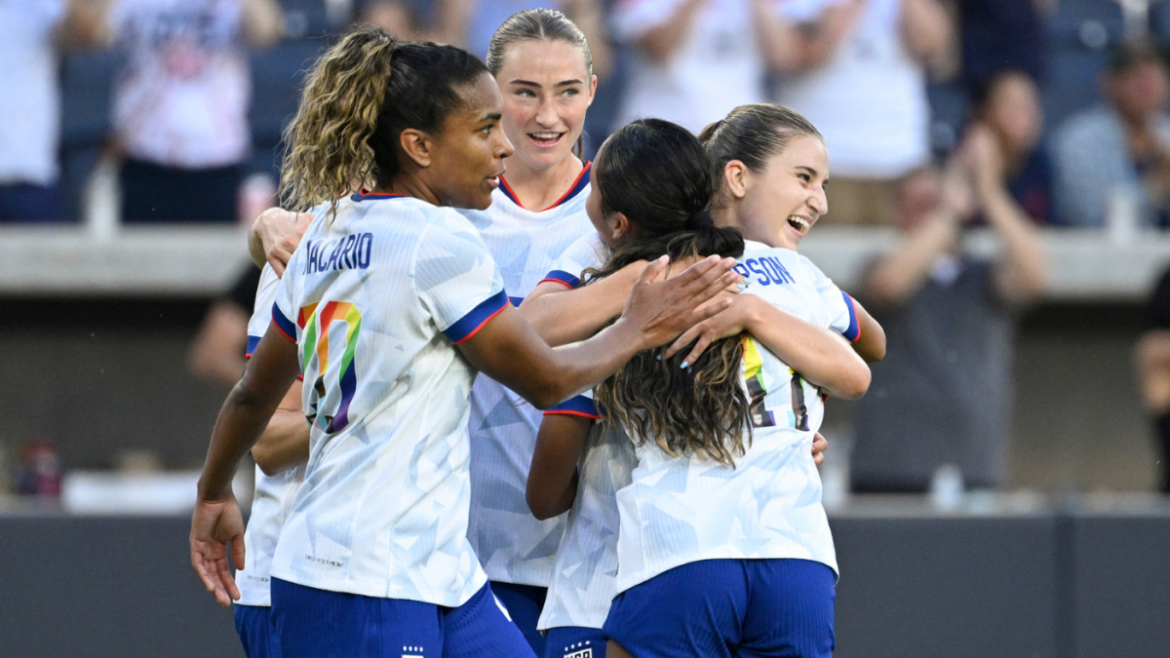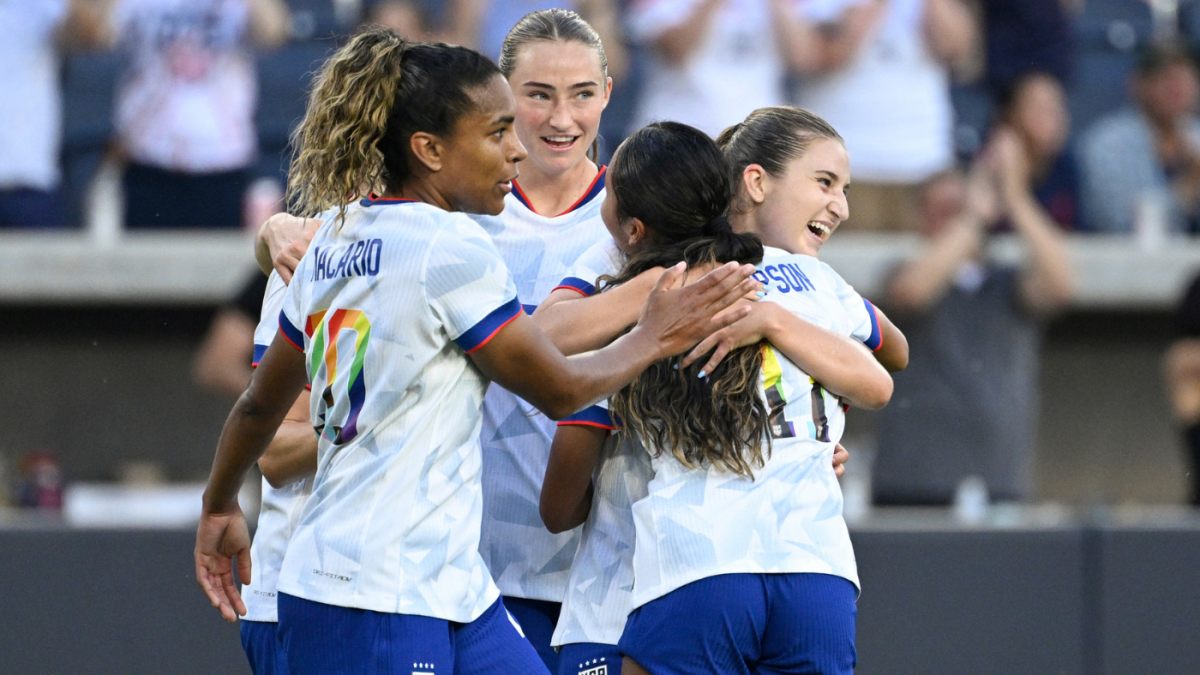The US Women’s National Soccer Team (USWNT) has long been a dominant force in international soccer, celebrated for its rich history of success, iconic players, and evolving tactical prowess. Recently, one of the central storylines surrounding the team centers on the absence of their famed attacking trio dubbed the “Triple Espresso,” consisting of Trinity Rodman, Mallory Swanson, and Sophia Smith (sometimes referred to as Sophia Wilson in content variants). This development has yielded a fascinating landscape for the team, revealing both the challenges and opportunities of navigating a new era without their established offensive pillars.
The Triple Espresso Phenomenon: A Force in Olympic Success
The nickname “Triple Espresso” gained traction following the trio’s incredible performance in the 2024 Paris Olympics, where they collectively scored 10 of the USWNT’s 12 goals on the way to securing gold. This nickname aptly captured their energetic, high-impact style of play, providing a constant jolt of offensive dynamism. Their contributions went beyond goals; their pace, creativity, and relentless pressure consistently dismantled rival defenses. The trio’s synergy epitomized modern women’s soccer excellence in the U.S., making their absence in subsequent matches all the more pronounced.
Absence of the Trio: Challenges and Strategic Adaptation
Following their Olympic glory, an unfortunate string of injuries and fitness issues sidelined the Triple Espresso, forcing head coach Emma Hayes and staff to reimagine the attacking front. This scenario has given rise to two distinct but interconnected narratives:
Offensive Struggles Without the Trio
In high-profile matches without Rodman, Swanson, and Smith/Wilson—such as the 0-0 stalemate against England at Wembley—the team has struggled to maintain its clinical edge in front of goal. Despite outshooting the opposition substantially, the substitute forward lines, including players like Alyssa Thompson, Lynn Williams, and Michelle Cooper, have found it challenging to convert chances, highlighting a gap in finishing and fluidity. Ali Krieger, a veteran commentator and former player, expressed concerns over the USWNT’s attacking cohesion without its star trio, emphasizing how their absence taps into a key “struggle” for the offense.
Emergence of New Talent and Tactical Flexibility
Contrary to concerns, the situation also illustrates the depth and adaptability of the USWNT roster. Players like Catarina “Cat” Macario and Alyssa Thompson have stepped up remarkably, with Macario notably delivering a commanding performance in a 3-0 win over China. The variation in lineups has allowed Hayes to experiment with alternative attacking configurations, providing valuable minutes and experience to younger players ahead of the 2027 World Cup cycle.
This phase marks a transitional period where variables such as fitness recovery timelines and new player integration will shape the team’s tactical identity. The USWNT’s ability to remain competitive sans their top scorers speaks to excellent squad depth but also underscores the need for the development of other attacking threats to share the scoring burden.
Roster Management and Future Outlook
The USWNT’s strategy through this period includes measured roster management to balance player recovery and competitive integrity. The “Triple Espresso” trio has missed multiple recent international windows, including notable events like the SheBelieves Cup and annual January training camps. Allowing the core attackers ample time to recuperate is crucial to sustaining long-term team success.
Moreover, coach Emma Hayes has signaled that this interim loss presents an opportunity to cultivate a broader attacking core. By exploring new combinations and nurturing rising stars, the team can avoid over-reliance on a single set of forwards. This approach will likely be pivotal for the next Women’s World Cup in 2027, where a rejuvenated and versatile squad will be essential.
Broader Context: Evolving Leadership and Team Identity
The aftermath of the Olympic cycle and the trio’s absence also coincides with a period where the USWNT is redefining its leadership and on-field identity. Post the retirement of legendary figures like Alex Morgan and Megan Rapinoe, the team is in search of new faces to embody leadership both on and off the pitch. Trinity Rodman is often mentioned as a potential star to assume a central leadership role, but the ongoing injury issues have slowed this transition.
Additionally, the increased presence and impact of Black women and other diverse players on the roster have been widely noted as forces enriching the cultural and competitive vibe of the team, infusing it with new energy and perspectives.
USWNT’s Winning Continuity During Transitional Phase
Despite missing their “triple espresso,” the USWNT continues to post strong results, showcasing resilience and an adaptable style that doesn’t solely rely on their superstar forwards. Wins with alternative lineups reinforce the squad’s quality and depth. Such outcomes challenge pundits and fans to reconsider the extent to which the team’s success depends on those three players and highlight the strategic acumen of the coaching staff.
Conclusion: Looking Beyond the Triple Espresso Era
The current period for the USWNT is one defined by both the void left by key players and the emergence of a promising new chapter. The short-term absence of Rodman, Swanson, and Smith presents undeniable tactical challenges, particularly in offensive sharpness and finishing. Nonetheless, it serves as a crucible for squad development, strategic innovation, and leadership reassessment.
As the USWNT prepares for upcoming competitions and looks forward to the 2027 Women’s World Cup, the lessons learned from operating without the Triple Espresso will likely fortify the team’s adaptability and depth. This evolution could ultimately diversify the team’s offensive threats on a permanent basis, ensuring the USWNT’s status as a global powerhouse endures well beyond this transitional phase.





